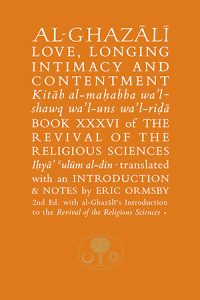Al-Ghazali on Love, Longing, Intimacy and Contentment (Ihya Ulumuddin Series No. 36)

Author: Imām Al-Ghazali
Translator: Eric Ormsby
Publisher: Islamic Texts Society
Year of Publication: 2016
Print Length: 296 pages
Genre: Islamic Studies / Quranic Studies; Theology, Ethics and Philosophy; Science, Reflection & Self-Development; Qur’anic Reflection, Supplication & Prayers; Non-Fiction / Religious Studies
Topic: Allah ﷻ, Prophet Muhammad ﷺ, Islam, Qur’an, Human Nature & Character, Human Psyche, Islamic Psyche, Love & Intimacy, Belonging, Ethics & Morality, Spirituality
The Book of Love, Longing, Intimacy and Contentment is the thirty-sixth chapter of Abu Hamid al-Ghazali’s Revival of the Religious Sciences. This was the first treatise which established not merely the possibility but the necessity for the love of God. Ghazali argues that all the virtues and spiritual stages that precede love, like repentance, patience and thankfulness, lead to love; and all the spiritual stages that follow on from love are a result of it. Out of Ghazali’s pioneering treatment would emerge not only new trends in Sufi theory and practice, but an entire body of mystical poetry including that of the great Persian poets Rumi and Hafiz. The translation is preceded by an extensive introduction which sets the work in its historical and spiritual context.
Table of Contents
Al-Ghazāli’s Introduction to the Revival of the Religious Sciences
Abbreviations
Preface
Introduction
Notes to Introduction
THE BOOK OF LOVE, LONGING, INTIMACY AND CONTENTMENT
Prologue
1. An Exposition of the Proof-Texts from Revelation Concerning Man’s Love for God
2. An Exposition of the True Nature and Causes of Love, with an Explanation of the Meaning of Human Love for God
3. An Exposition that God Alone Merits Love
4. An Exposition that the Noblest and Loftiest Pleasure is Knowledge of God and Contemplation of His Blessed Face and Only He Who Is Denied this Pleasure can Conceivably Prefer Another To It
5. An Exposition of Why the Beatific Vision of the World to Come Surpasses Knowledge in this World
6. An Exposition of the Factors that Strengthen Love of God
7. An Exposition of Why there are Disparities among People with Respect to Love
8. An Exposition of Why the Human Understanding is Unable to Know God
9. An Exposition of What Longing for God Means
10. An Exposition of the Meaning of God’s Love for Man
11. The Distinguishing Marks of Man’s Love for God
12. An Exposition of the Meaning of Intimacy with God
13. An Exposition of the Meaning of the Uninhibitedness and Forwardness which Overmastering Intimacy Produces
Prologue: The Meaning of Contentment with God’s Decree: Its True Nature and What Tradition Reports of Its Merit
14. An Exposition of the Merit of Contentment
15. An Exposition of the Essence of Contentment (and How It Can be Conceived as a Check to Appetite)
16. An Exposition that Supplication is not in Conflict with Contentment
17. An Exposition that Fleeing and Censuring a Country Reputed Sinful Is not Contrary to Contentment
18. A Compilation of Anecdotes about Lovers, Together with their Sayings and Innermost Illuminations
19. Conclusion: Various useful Sayings Regarding Love
Notes
Appendix: Persons Cited in Text
Bibliography
Index to Qur’ānic Quotations
General Index

Imām Abu Hamid al-Ghazali is a 11th century Muslim scholar. He was one of the most prominent and influential philosophers, theologians, jurists, and mystics of Sunni Islam. Al-Ghazālī was born at Ṭūs (near Mashhad in eastern Iran) and was educated there, then in Jorjān, and finally at Nishapur (Neyshābūr), where his teacher was al-Juwaynī, who earned the title of imām al-ḥaramayn (the imam of the two sacred cities of Mecca and Medina). He was active at a time when Sunni theology had just passed through its consolidation and entered a period of intense challenges from Shiite Ismâ’îlite theology and the Arabic tradition of Aristotelian philosophy (falsafa). Al-Ghazâlî understood the importance of falsafa and developed a complex response that rejected and condemned some of its teachings, while it also allowed him to accept and apply others. His great work, Iḥyāʾ ʿulūm al-dīn or Ihya Ulumuddin (“The Revival of the Religious Sciences”), made Sufism (Islamic mysticism) an acceptable part of orthodox Islam.
Source: https://plato.stanford.edu/entries/al-ghazali/
More from Imam al-Ghazali in this library, click here.

Eric Ormsby was Director of the Institute of Islamic Studies at McGill University. He is at present Professor at the Institute of Ismaili Studies, London. He received his Ph.D. in Near Eastern Studies, with specialties in Islamic theology and philosophy, at Princeton University. He has taught at Princeton, The Catholic University of America, McGill University and the Institute of Ismaili Studies, as well as previously in Intellectural Encounters of the Islamicate World. He is the author of Theodicy in Islamic Thought (Princeton, 1984) among other scholarly books and articles on the subject of Islamic theology.
Source: https://www.geschkult.fu-berlin.de/en/e/ieiw/Neu_Teaching/Teaching-Staff/teaching_staff_1819/ormsby_eric/index.html
More from Eric Ormsby in this library, click here.
